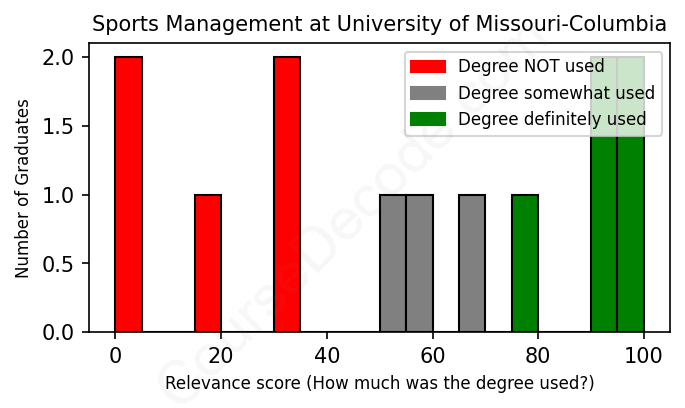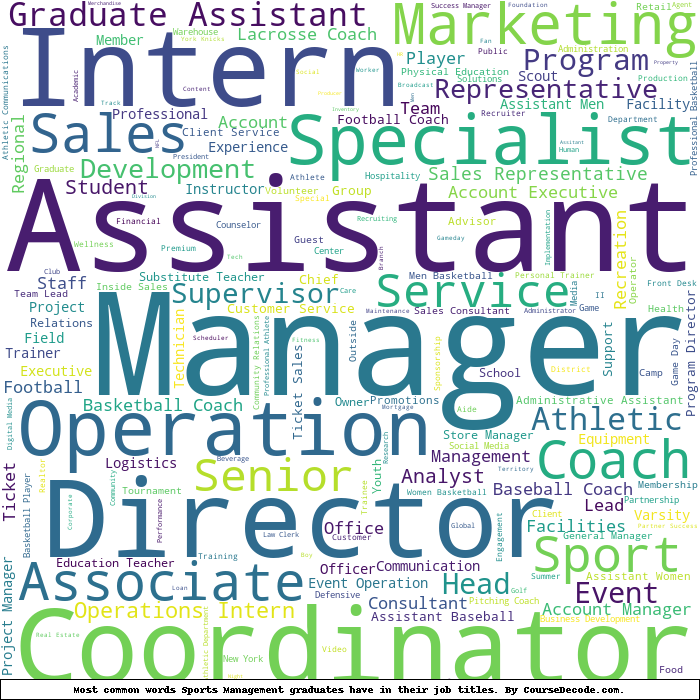
First, some facts. Of the Sports Management graduates from University of Missouri-Columbia we've analyzed , here's how many have used (or NOT used) their degree in their career:

These are estimates based on AI analysis of 13 LinkedIn profiles (see below).
The verdict? Significantly below average. Overall, with an average relevance score of 55%, Sports Management graduates from University of Missouri-Columbia have a much lower likelihood (-12%) of finding work in this field compared to the average graduate across all fields:
And for comparison, here's the chart for all profiles we've looked at across all degrees.
Also, after graduating, only 23% of these graduates have pursued further education other than another Bachelor's degree (such as a Masters degree or other), compared to the average across all profiles of 35%. This suggests a Bachelors degree is enough for most Sports Management graduates, and it's normal to look for work straight after graduation.
See the details:
|
Relevance score: 19% We think this person has NOT gone into a career related to their degree. We think this person has NOT gone into a career related to their degree.
DEGREE INFOGraduated in 2013 from University of Missouri-Columbia with a Bachelor's degree in Parks, Recreation & Tourism in Sports Management. No other secondary education since. JOB HISTORY SINCE GRADUATIONSport/Program Intern Wildwood YMCA Jan 2013 - Aug 2013 Sport Camp Director  Wildwood YMCA Apr 2013 - Aug 2013 Bartender/Server  Wildwood Pub and Grill Apr 2014 - Apr 2015 Sales Associate  Under Armour Sep 2014 - Apr 2015 Assistant Manager  Under Armour Apr 2015 - Jul 2017 Inside Sales Coordinator  Porta-King Building Systems Aug 2017 - Present ABOUTNo information provided. |
The top 10 most common jobs done by the graduates we've analyzed (ranked most common to least) are:
When looking at the career paths of graduates from the University of Missouri-Columbia with a degree in Sports Management, it's clear that many have ventured into various industries, but the relevance to their field of study varies quite a bit. A number of individuals found positions closely tied to sports management principles, such as working as Athletic Administration Graduate Assistants, Sport Camp Directors, and Event Management Interns. These roles align well with their educational background and make great use of the skills they learned during their studies in sports management. A few standouts are those who worked directly in sports organizations, such as the NFL and various minor league teams, where they could apply their knowledge of operations, marketing, and event management directly in the sports arena.
However, there’s also a noticeable trend of graduates landing jobs that aren’t particularly related to sports management. Many made a shift into roles in insurance, sales, or general management where the sports-specific skills they developed in college weren't utilized effectively. Positions like Inside Claims Adjuster or Retail Sales Associate, while providing work experience, don’t leverage their sports management education. So while there are certainly graduates thriving in sports-related roles, it's clear that a significant number have found themselves in jobs that stray quite a bit from their original career goals in sports management. The results highlight the mixed bag of opportunities that exist for these grads, reinforcing the idea that, while a degree in sports management can open certain doors, it doesn’t guarantee a trajectory strictly within the sports industry.
Here is a visual representation of the most common words in job titles for Sports Management graduates (this is across all Sports Management graduates we've analyzed, not just those who went to University of Missouri-Columbia):

Graduates from the University of Missouri-Columbia with a degree in Sports Management seem to have a pretty varied career trajectory. Many of them kick off their careers with internships or entry-level positions in sports-related roles, like internships with local sports teams, recreation departments, or sport camps. For example, some have started as interns at places like the Kane County Cougars or at local YMCAs, which gives them valuable experience right out of college. However, as we look a bit further into their careers, it's clear that not everyone stays in the strictly "sports management" lane. While some graduates do find their way into relevant positions like baseball coaches, athletic administration, or team operations, others have drifted into roles in sales, customer service, and even insurance. So, it's a mixed bag.
Fast forward five to ten years, and we see some graduates landing solid positions in the sports world, but others have ventured into fields unrelated to sports. For instance, some have climbed the ranks in organizations like the National Football League or started their own companies in the sports sector, while others are working in business management or sales. The overall picture suggests that while some graduates are successfully building careers in sports management, a significant number have found themselves in different industries, potentially due to available job opportunities or personal choices. Ultimately, if you're considering this degree, it could lead to great things in the sports field, but be open to the idea that some paths might take you in a different direction.
Getting a Bachelor’s degree in Sports Management at the University of Missouri-Columbia, or really anywhere, is generally on the easier side compared to some of the more rigorous degrees out there, like engineering or pre-med. That said, it still requires a decent amount of work. You'll have to balance classes about sports finance, marketing, and management, along with possibly some internships or hands-on projects. If you enjoy sports and are passionate about the industry, you'll probably find it pretty engaging and manageable. Just be ready to put some effort into your studies and get involved in any hands-on experiences offered, and you should do just fine!
Most commonly, in the LinkedIn profiles we've looked at, it takes people 4 years to finish a Bachelor degree in Sports Management.
Looking at the career paths of these Sports Management graduates from the University of Missouri-Columbia, it seems like they’ve had a mixed bag when it comes to making decent money. Some have climbed the ladder in insurance and sales roles, like the Allstate claims leader, which typically pays pretty well, while others started in lower-paying positions like interns or service roles in sports facilities or retail. The folks who ventured into coaching or sports-focused startups might be passionate about their work but could be earning less, especially early on. Overall, it looks like a few are doing well financially, especially those moving into managerial or specialized roles, while others may still be working their way up, which is totally normal. So, it’s a range of outcomes depending on the specific field they focused on and their career choices.
Here is a visual representation of the most common words seen in the "about" section of LinkedIn profiles who have a Bachelor degree in Sports Management (this is across all Sports Management graduates we've analyzed, not just those who went to University of Missouri-Columbia). This may or may not be useful:

Here are all colleges offering a Bachelor degree in Sports Management (ordered by the average relevance score of their Sports Management graduates, best to worst) where we have analyzed at least 10 of their graduates: